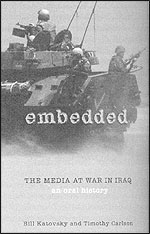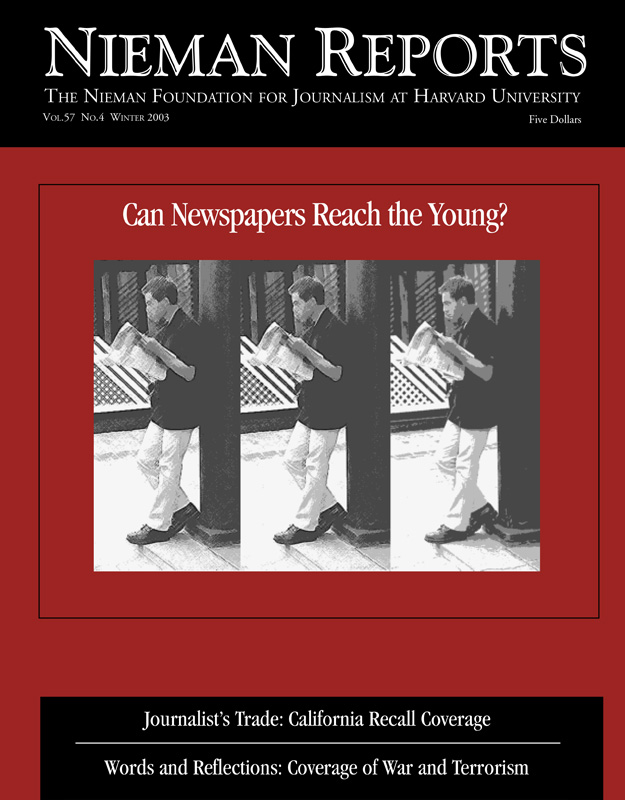 Embedded: The Media at War in Iraq: An Oral History
Embedded: The Media at War in Iraq: An Oral History
Edited by Bill Katovsky and Timothy Carlson
The Lyons Press. 422 Pages. $23.95.
John Burns, The New York Times’s chief foreign correspondent, was interviewed for this book (even though he was not embedded), and his words appear in a chapter entitled, “The Moral Compass of Iraq.” Excerpts from his observations about reporting in Iraq and from other areas of conflict follow.
“There was one major media organization—the BBC—that didn’t even go to Abu Ghraib prison on the afternoon of October the 20th last year. Imagine being in the Soviet Union, and you had a chance to be admitted to the heart of darkness at the time of the Great Terror. That is what Abu Ghraib was all about. You had the BBC thinking it was inappropriate to go there because it means that it causes trouble. I couldn’t find among my colleagues a single one who had read the human rights reports about Abu Ghraib. When Abu Ghraib came down, most didn’t even know where Abu Ghraib was.
“We were summoned on that Sunday morning to form a motorcade outside the Information Ministry. They didn’t tell us where we were going. It turned out to be Saddam’s first tactical response to Bush.
... as we headed west on the motorway, anybody who’d read the human rights reports knew where we were going. The problem was even when we arrived outside it, 98 percent of them [journalists] had never heard of Abu Ghraib. Had no idea of what it was. …
“I found myself in the execution chamber—Special Judgment Division—where 20 or 30 butcher’s hooks hanging from the ceiling rusty and red, soiled trousers were thrown about the room. It was horrid. Protests started in the days that followed. Sweeping across this prison floor were mostly women. Looking for sons, husbands, brothers, who had disappeared years before; wailing and throwing themselves on the ground and appealing to Allah. You couldn’t miss this. They then formed themselves into groups and went to protest outside Intelligence Ministry buildings, which is phenomenal. They never protest. Some of my colleagues chose not to cover that. Saying it would only get you into trouble.
“The whole performance was woeful. I knew that I was walking a very fine line. The question was not so much could I get a new visa, because I was sure the time would come I couldn’t even buy a visa. The question was, would I end up in Abu Ghraib myself?
“In February I was denied a visa. Then I found there were visas available. I was in Amman. Some of my rivals who had omitted to notice that Iraq was a terror state were busy here sucking up. They were very pleased with themselves. These were people who’d argued that it was essential to be in Iraq for the war. I got a visa of dubious quality; it was a visa which allowed me to come in and cover the peace movement. I assumed I would be thrown out immediately. I arrived only two weeks before the war.
“I went to the ministry of information director, General Uday Al-Tayyib. I said to him, ‘We’ll never agree about the nature of this society. But you’re about to go to war with the United States. I think that you need America’s principal newspaper here.’ He said, ‘You’ve written a great deal about killing here in Iraq, Mr. Fisher,’ as they called me, which is my middle name, ‘This is good. This is a shame for the Iraqi people. But now the Americans will be killing Iraqis. Will you write about that?’ I said, ‘Whether it’s an Iraqi government that is killing Iraqis, or an American government that is killing Iraqis, it’s the same to me; I will write about both.’
“They accredited me. But I was immediately warned by friends in the ministry that it was a ruse; I would not be given a minder. They took my passport away and held it for five days until a man who is said to be a deputy director of the Mukhabarat showed up one day—a certain Mr. Sa’ad Mutana. He was assigned to be my minder. He was an extremely unpleasant man. At this point a dozen people from the Information Ministry came to me and said, ‘Get out!’ He was certainly the senior official. He introduced himself as a former general. The reason they kept me here is that when the war starts, I could become a hostage. Well, I stayed. On the night of April 1, they came to my room at this hotel and said, ‘You’re under arrest. We’ve known all along you’re a CIA agent. You will now collaborate with us or we will take you to a place from which you will not return.’ They stole all my equipment. They stole all my money. Then they left. The hotel had no electrical power at the time. They said, ‘You stay in your room.’ I assumed they left somebody outside. I went out into the darkened corridor. There was nobody there, so I slipped into the stairway. To tell you the truth, I didn’t know what to do. As it happened, a friend of mine, an Italian television correspondent, happened to be coming up the stairwell. She asked, ‘What are you doing?’ I replied, ‘I really don’t know. I’m at wit’s end.’ She said, ‘You come to my room. They won’t attack my room.’ She is a former Italian communist who had not challenged them. So there’s a strange inversion. I found my safety at a critical moment with an old friend who had not challenged them. …
“Now left with the residue of all of this, I would say there are serious lessons to be learned. Editors of great newspapers, and small newspapers, and editors of great television networks should exact from their correspondents the obligation of telling the truth about these places. It’s not impossible to tell the truth. I have a conviction about closed societies, that they’re actually much easier to report on than they seem, because the act of closure is itself revealing. Every lie tells you a truth. If you just leave your eyes and ears open, it’s extremely revealing. We now know that this place was a lot more terrible than even people like me had thought. There is such a thing as absolute evil. I think people just simply didn’t recognize it. They rationalized it away. I cannot tell you with what fury I listened to people tell me throughout the autumn that I must be on a kamikaze mission. They said it with a great deal of glee, over the years, that this was not a place like the others. …
“In this profession, we are not paid to be neutral. We are paid to be fair, and they are completely different things. For example, in Bosnia it was perfectly clear from very early on who were the principal villains of that war. Yes, the Muslims and the Croats got off some mayhem. But who started the war? Who did the overwhelming majority of the killing? The Serbs did. I worked for an editor at the time who wanted me to iron out of my stories any implication that there was one principal offender. He would have been happy with a story that said, ‘They are all as bad as one another. This has been going on in the Balkans since the beginning of time.’ This attitude comes from a complete misapprehension as to what our business is. Yes, we should be absolutely ruthless as to fact. We should not approach a story with some sort of ideological template that we impose on it. We should let the facts lead us to conclusions, but if the conclusions seem clear, then we should not avoid those on the basis of an idea we are supposed to be neutral. Because if that were the case, they might as well hire a stenographer, and a stenographer would be a lot cheaper than I am.
“As far as I am concerned, when they hire me, they hire somebody who has a conscience and who has a passion about these things. I think I was a little bit advantaged in this, because I am 58 years old.”



